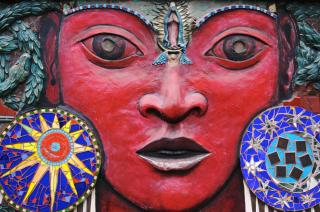Courage Requires Vulnerability

A close-up of the mosaic/mural “Tonantzin Renace” on 16th Street near Sanchez in San Francisco, California.
“Though we tremble before uncertain futures, may we meet illness, death, and adversity with strength. May we dance in the face of our fears,” writes trailblazer Gloria Anzaldua, who knew a thing or two about courage.
Courage requires both vulnerability and careful strategy.
Like other people of color, I don’t often show my full self in mostly-white company. I am guarded—not inauthentic, because the me that has learned to navigate mostly-white spaces is a part of me; it just isn’t my whole self. To bring my full self would risk being misunderstood. More than that, I would risk inviting even more harmful words and behaviors into my day, and already each day is an exhausting dance of negotiating interactions and conversation.
Hundreds of times a day, I must ask myself: How much of me do I allow this person or group to see? How much of that decision is about risking vulnerability, and how much is about self-preservation? Does withholding my full self alleviate the discomfort of another, or does it bring me closer to true freedom? Who benefits from this risk more?
Courage is not demanding “safety” when confronting the annoyance of having one’s haughty and long-held answers questioned. It is incompatible with despair.
Courage is not becoming defensive, or insisting upon being viewed as an individual when the privileges of membership in a dominant group are brought to light. Rather, courage recognizes that growth insists on a willingness to be utterly transformed.
Courage is not believing that anyone is “helping” or coming to “the assistance of” members of marginalized groups. Rather, it is recognizing that the need to play savior comes from societal brainwashing caused by systems that convince some they are superior over others.
Courage is seeking one’s own liberation from these lies, knowing it will require a relinquishment of power and an admittance that they’ve been bamboozled. Courage does not require perfection from us, or air-tight plans, or even expertise.
I’ll tell you what courage does require: Courage requires taking great risks while stepping into the unknown.
It takes no courage to shut one’s mouth, step aside, and listen when needed. The only thing at risk here is one’s ego; a self-identity built around the myth of superiority.
Courage does not ask us to stop trembling; it asks us to find ways to incorporate our trembles into our dance.
Courage, the faithful companion of hope, is sticking around when “we” and “us” are spoken in contexts that clearly don’t mean “me.”
Courage is claiming this faith as home when nearly everything around me says I am out of place, yet everything inside me says I am home.
Courage is the generations and generations of ancestors who taught us to actively pursue joy, laughter, and celebration alongside outrage, grief, and fatigue.
The goddess Tonanztin, madre de los Méxicos, bringer of corn, nuestra morenita, teaches that we can make for ourselves a place of comfort and leave room for wonder, even when our home has been invaded and has become nearly unrecognizable. Courage is being firm in saying, “I know exactly where home is and what it looks like. I will figure out any way to get there, with the help of good friends. We will dance the whole way there, through the terrifying unknown. I will brave the rough waters knowing that my boat may be smalI but it is strong. I will leave a trail of beauty in my wake, so that other courageous seekers who follow will not be lonely on their journeys.”
| Date added | |
|---|---|
| Tagged as |